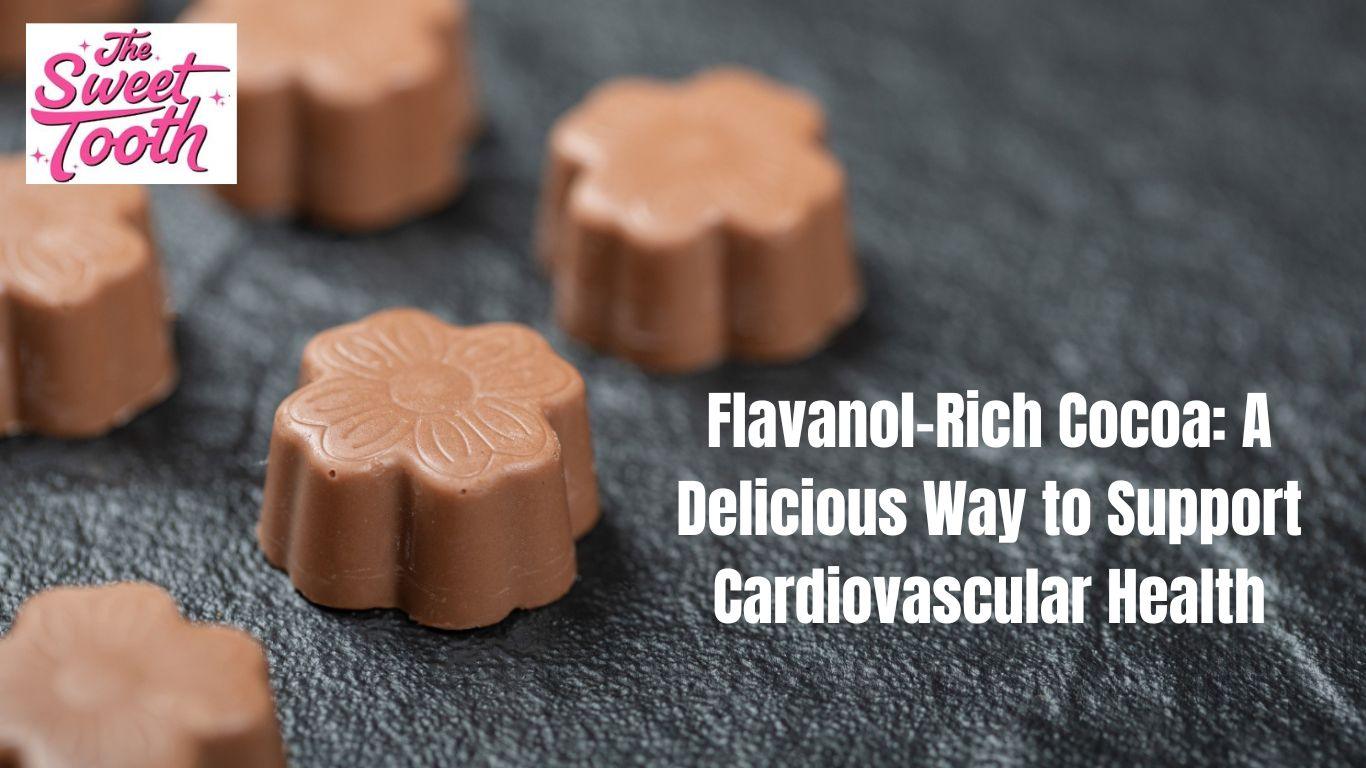
Flavanol-Rich Cocoa: A Delicious Way to Support Cardiovascular Health
Stress and poor dietary habits can wreak havoc on your heart, but new research shows that flavanol-rich cocoa might be a game-changer. This natural powerhouse can protect your cardiovascular system from the effects of stress and high-fat meals. Learn how incorporating cocoa into your diet can be a simple yet effective strategy for better heart health.
The Connection Between Stress, Food, and Heart Health
Modern life is full of stress, and for many, that stress leads to poor eating habits—often high-fat, convenience foods that can negatively impact cardiovascular health. Studies, such as those conducted by researchers at the University of Birmingham, reveal that these eating patterns reduce vascular function and oxygen delivery to the brain.
The good news? Incorporating flavanol-rich foods, like minimally processed cocoa, into your diet can provide a layer of protection for your heart. At The Sweet Tooth, we’re all about turning indulgence into a health-conscious choice.
What Are Flavanols and How Do They Benefit You?
Flavanols are natural compounds found in foods such as cocoa, tea, berries, and some nuts. Known for their antioxidant properties, flavanols play a key role in improving blood flow, regulating blood pressure, and reducing the risk of cardiovascular disease.
According to experts, including Dr. Catarina Rendeiro from the University of Birmingham, flavanols are particularly effective in countering the effects of stress on vascular health. This makes cocoa a delicious and practical option for supporting your heart during challenging times.
New Study: Cocoa to the Rescue
In a recent study published in Food and Function, researchers tested the impact of flavanol-rich cocoa on vascular function during stress. Participants were given a fatty breakfast (think buttery croissants and cheddar cheese) and paired it with either a high-flavanol or low-flavanol cocoa drink. The results were compelling.
The Study Design
The study evaluated how different cocoa drinks influenced vascular function under stress. Here’s how it worked:
- Participants consumed a high-fat meal, followed by either a high-flavanol cocoa drink (695 mg flavanols) or a low-flavanol drink (5.6 mg flavanols).
- They then completed an 8-minute mental stress test. Researchers monitored their cardiovascular activity, blood flow, and prefrontal cortex oxygenation.
High-flavanol cocoa was made with non-alkalized cocoa powder, preserving its rich flavanol content. Low-flavanol cocoa, on the other hand, used alkalized cocoa powder—a process that enhances flavor but significantly reduces flavanol levels.
The Results
The findings were clear:
- High-flavanol cocoa improved vascular function. Measurements of brachial flow-mediated dilatation (FMD) showed better results compared to the low-flavanol drink, even up to 90 minutes after the stress period.
- Fatty meals paired with low-flavanol cocoa impaired vascular recovery. Stress and high-fat foods alone reduced FMD by 1.29%, but this decline was prevented when participants consumed high-flavanol cocoa.
If you’re wondering where to find quality cocoa for these benefits, check out the high-flavanol cocoa options at The Sweet Tooth.
Making Flavanols Part of Your Daily Routine
The study underscores the importance of incorporating flavanol-rich foods into your diet, particularly during stressful times or after consuming high-fat meals. Luckily, there are plenty of ways to boost your flavanol intake.
High-Flavanol Foods
Besides cocoa, you can find flavanols in:
- Green and black tea: A natural and refreshing source of flavanols.
- Berries: Blueberries, raspberries, and strawberries are packed with these powerful compounds.
- Apples and nuts: Easy-to-find snacks that offer a flavanol boost.
How Much Flavanol Do You Need?
Experts recommend a daily intake of 400–600 mg of flavanols. This can be achieved through:
- Two cups of green or black tea.
- A handful of berries or an apple.
- A single serving of high-quality cocoa.
At The Sweet Tooth, you’ll find premium, minimally processed cocoa products designed to support your health while satisfying your cravings.
Stress and Cardiovascular Health
Stress is unavoidable, but its impact on your body doesn’t have to be. Small lifestyle changes, like adding flavanol-rich foods to your routine, can significantly improve vascular health and resilience.
Jet Veldhuijzen van Zanten, a biological psychologist at the University of Birmingham, points out, “Modern life is stressful, but small dietary changes can help counter some of the negative effects on our health.”
If you’re someone who turns to food for comfort during high-stress periods, choosing flavanol-rich options like cocoa can be a heart-smart choice.
Choosing the Right Cocoa
Not all cocoa products are created equal. To reap the full benefits of flavanols, look for minimally processed, non-alkalized cocoa powder. This ensures a higher concentration of these beneficial compounds compared to heavily processed or alkalized options.
For premium cocoa products that deliver both flavor and health benefits, visit The Sweet Tooth.
Conclusion
Flavanol-rich cocoa is more than just a delicious treat; it’s a powerful ally for cardiovascular health. By making mindful choices—whether sipping on a cocoa drink or snacking on flavanol-rich berries—you can protect your vascular system from the effects of stress and poor diet.
Start your journey to better heart health today with high-flavanol options from The Sweet Tooth, where indulgence meets wellness.
FAQs
-
What are flavanols, and why are they important?
Flavanols are natural compounds found in foods like cocoa and tea. They improve blood flow, regulate blood pressure, and protect against stress-induced vascular damage.
-
How can I incorporate more flavanols into my diet?
Try high-flavanol cocoa, green or black tea, and flavanol-rich fruits like berries and apples.
-
What type of cocoa should I buy?
Opt for non-alkalized, minimally processed cocoa to maximize flavanol content. Explore The Sweet Tooth’s range for the best options.
-
How much flavanol should I consume daily?
Experts suggest 400–600 mg per day, easily achieved with tea, berries, and cocoa.
-
Does cocoa help with stress?
While cocoa flavanols primarily benefit vascular health, they can be a comforting and heart-healthy addition during stressful periods.
Take the first step toward better cardiovascular health today. Indulge in flavanol-rich cocoa from The Sweet Tooth and feel the difference!



